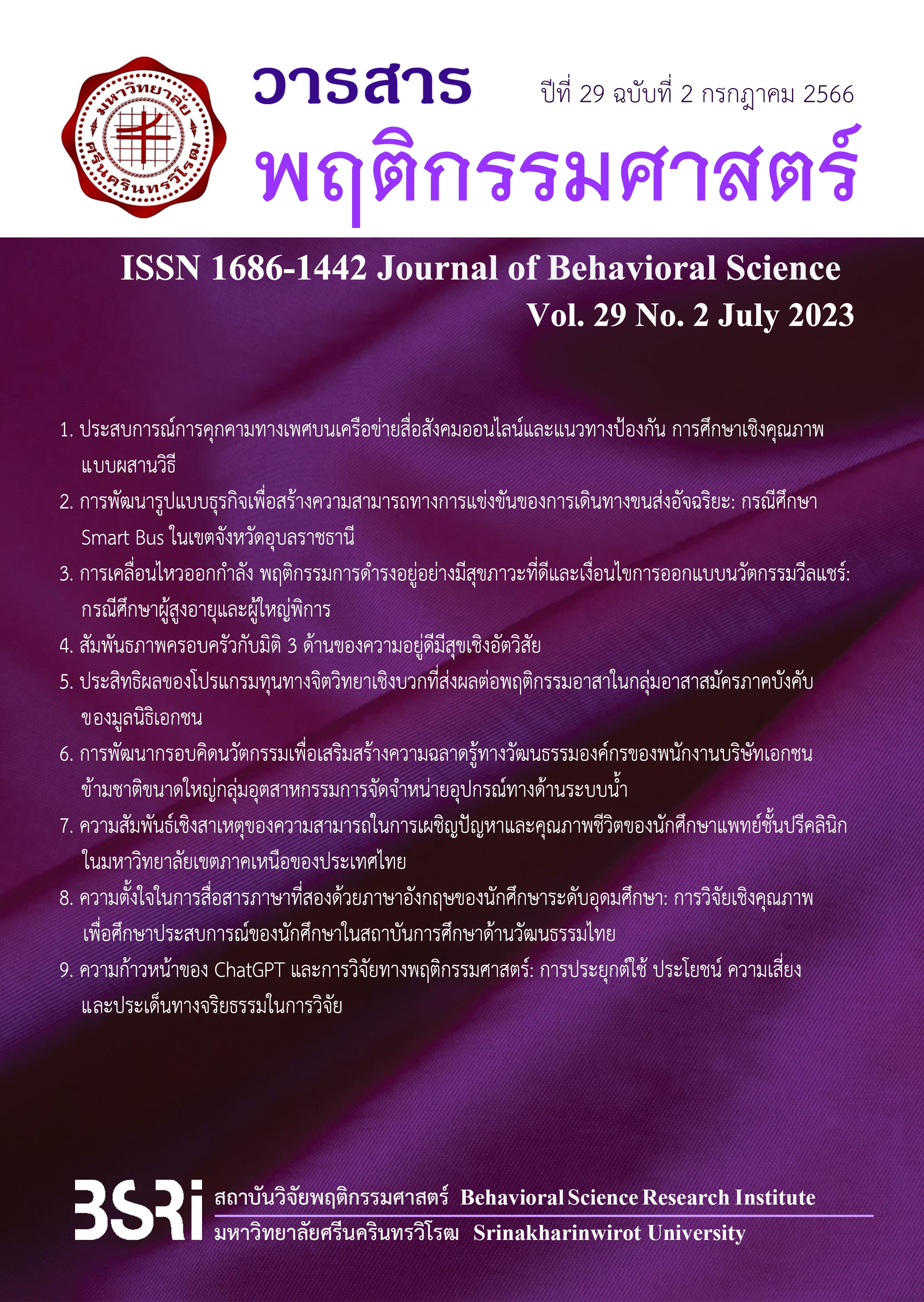Factors Affecting the Use of Intelligent Transportation Services: A Case Study of Smart Bus in Ubon Ratchathani Province
Keywords:
Expectation of mass transit service, factors that encourage passengers to use smart bus services, telling new passengers to use the smart bus serviceAbstract
A research on factors affecting the use of intelligent transportation services: A case study of Smart Bus in Ubon Ratchathani Province. The objectives were to 1) study travel behavior and use of mass transit services; 2) study the level of opinions on factors affecting the use of intelligent transportation services; 3) to analyze the causal relationship of the factors that affected continue to spread the word on the provision of intelligent bus services. Ubon Ratchathani province, This research is a quantitative research. The research tools were questionnaires. The sample groups were consumers who had used public transportation. and those using public bus service, Ubon Ratchathani province, in the amount of 420 people.The level of opinions about the expectation of mass transit services. The average was at a high level ( = 4.13, SD = 0.58). The level of opinions about factors supporting passengers to use the service smart bus was at a high average level ( = 4.57, SD = 0.54). The level of opinions about the factor telling passengers to use the smart bus service was at a high average level ( = 4.49, SD = 0.69). In the route analysis, factors affecting the use of intelligent transportation services, it was found that 1) the expectation factor of mass transit services had a positive direct influence on the use of intelligent bus service use telling factors. Ubon Ratchathani province, the route coefficient was 0.063 and had a positive direct influence on the factors supporting passengers to use smart bus services. The route coefficient was 0.192. 2) The factor supporting passengers to use the smart bus service. There was a positive direct influence on the word-of-mouth factor for using the service. smart bus Ubon Ratchathani province had a route coefficient of 0.877 and 3) expectation factors for mass transit service There is an indirect cause influence on the wording factor for using the service. Smart bus Ubon Ratchathani province has a route coefficient equal to 0.578 through the route factor supporting passengers to use the smart bus service Results from the research of consumers who use public transportation. Ubon Ratchathani smart bus, give importance to the factors of public transport service system, public buses and to focus on supporting factors and word of mouth in using the intelligent bus service. This will lead to increased service traffic.
Downloads
References
Assael, H. (1998). Consumer behavior and marketing action (6th ed.). South-Western Collage.
Blair, G. M. (1968). Educational Psychology. Macmillan.
Chong-Utsa, S. (2018). Efficiency of transportation system. Public in urban areas to support the dual-track railway system [Master’s Thesis]. Rajamangala University of Technology Isan.
Chulachaow, S. (2019). A study on application quality assessment for public buses in Khon Kaen: A case study of KK transit [Master’s Thesis]. Rangsit University.
Chusaeng, A. (2021). Business Image and Service Quality Affecting Return to Service. Repair engine and car suspension in Khlong Sam Subdistrict Khlong Luang District Pathum Thani Province. Academic Journal of Eastern University of Management and Technology, 18(1), 79-91.
Department of Land Transport. (2018). Opening up a new history, modernizing the development of passenger terminals across the country. Installation of real-time bus travel information display Smart Bus Terminal. https://www.dlt.go.th/th/public-news/view.php?_did=2079
Emrat, K. (2014). Relationship between service strategy and competitive advantage of hotel business in Thailand [Master’s Thesis]. Mahasarakham University.
Ennew, C. T., Banerjee, A. K., & Li, D. (2000). Managing word of mouth communication: Empirical evidence from India. International Journal of Bank Marketing, 18(2), 75-83.
Kotler, P., & Armstrong, G. (2004). Principles of marketing (10thed.). Pearson Prentice Hall.
Pattanakittiworakul, C. (2010). E – Word of Mouth influences consumers' purchasing decisions on Internet Case Study E – Marketplace in Thailand [Master’s Thesis]. College of Innovation, Thammasat University.
Petcharat, P. (2013). Service Quality Affecting Taxpayer Satisfaction. Nakhon Ratchasima Area Revenue Office 2 [Master’s Thesis]. Rajamangala University of Technology Isan.
Prasongsuk, R. (2015). Quality of business services of Journal of Medical Technology [Master’s Thesis]. Valaya Alongkorn Rajabhat University under the Royal Patronage Pathum Thani Province.
Satchukorn, S. (2003). Hospitality and excellent service (4th ed.). Sai Thanasawat.
Smart City Steering Committee. (2019). Assessment Criteria, Qualifications, Methods and The process of considering a smart city.
Sopha, S. (2013). Expectations and satisfaction of students towards the services at the English and Mathematics Preparatory Center [Master’s Thesis]. Silpakorn University.
Sungsuwan, T. (2021). Success Factors in Customer Relationship Management by Application. Information technology to develop service innovation: A case study of boutique hotels in Pattaya [Master’s Thesis]. Burapha University.
Tangkaitanon, N. (2015). The impact of the proactive service strategy on the performance of the hotel business in Thailand [Master’s Thesis]. Mahasarakham University.
Ubon Ratchathani Chamber of Commerce (2019). Meeting of the committee and working group to drive Smart City Ubon Ratchathani and working group to drive Chong Mek Happy Valley No. 4/2019. https://www.ubonchamber.net/page/id/1574656798080565
Wangdee, B. (2015). Service Quality Expectations Affecting Satisfaction and Loyalty in Using QR Code Service for Shopping at Large Retail Stores of the People in Bangkok [Master’s Thesis]. Bangkok University.
Wongsansri, P. (2004). Organization and management (7th ed.). Faculty of Management Sciences, Suan Dusit Rajabhat Institute.
Zhang, J., Shen, D., Tu, L., Zhang, F., Xu, C., Wang, Y., Tian, C., Li, X., Huang, B. & Li, Z. (2017). A Real-Time Passenger Flow Estimation and Prediction Method for Urban Bus Transit Systems. IEEE Transactions on Intelligent Transportation Systems, 18(11), 3168-3178. https://doi.org/10.1109/TITS.2017.2686877
Downloads
Published
How to Cite
Issue
Section
License
Copyright (c) 2023 Warasan Phuettikammasat

This work is licensed under a Creative Commons Attribution-NonCommercial-NoDerivatives 4.0 International License.
Behavioral Science Research Institute, SWU
114 Sukhumvit 23, Bangkok 10110, Thailand.
Tel.02-649-5000 # 17600



